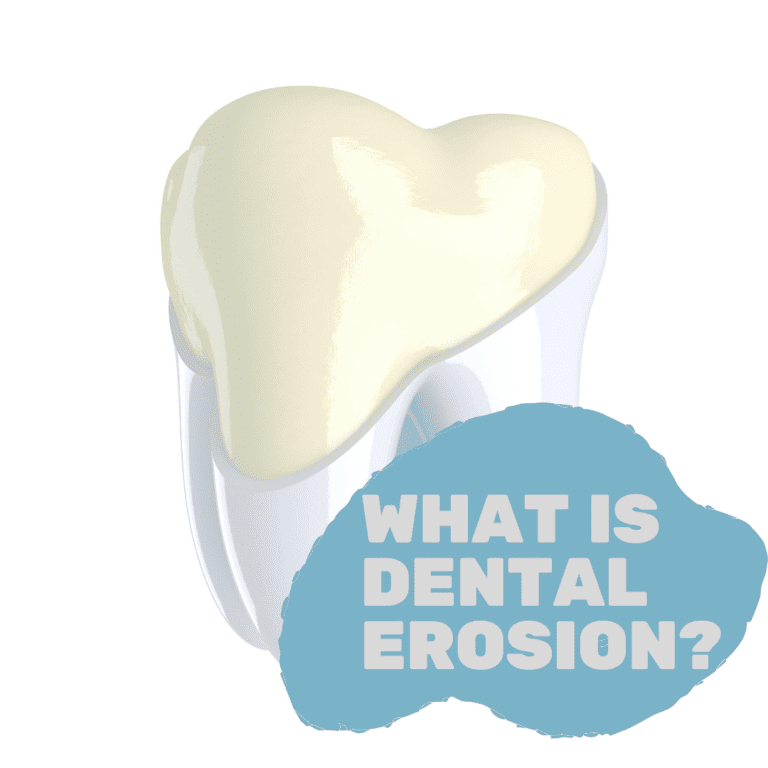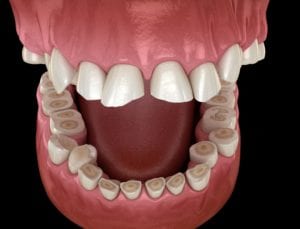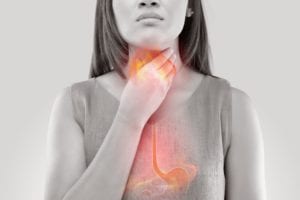What is Dental Erosion?

Did you know that tooth enamel is the strongest substance in the human body? In fact, tooth enamel is 96% minerals, which also makes it the most mineralized substance in the human body. Specifically, enamel is composed of hydroxyapatite, which is calcium and phosphate arranged in a crystalline pattern. Both these components and their arrangement are what makes enamel as strong as it is.
Even with this strength, however, tooth enamel is not indestructible and it can still be damaged. The most common cause is demineralization of the enamel that occurs when excess bacteria deposit acidic waste products on the surface of the teeth. This demineralization is more commonly known as tooth decay, or dental cavities.
While this is the most common cause of enamel damage, it is not the only thing that can damage the enamel. Another cause of enamel damage is dental erosion. Dental erosion is defined by the American Dental Association as the loss or wear of dental hard tissue by acids not caused by bacteria. There are various things that can cause dental erosion, including:

Bruxism
Bruxism is the term used to describe teeth grinding or clenching. Both behaviors often occur at night and many people are unaware they do it. However, regularly grinding or clenching your teeth exposes them to large amounts of abnormal force, which wears down the enamel and causes it to erode over time.
Dry Mouth
Saliva helps to regulate the acid content in the mouth in order to protect the teeth. However, people who suffer from dry mouth produce less saliva and can have higher concentrations of acid in their mouth as a result. Dry mouth is usually caused by medical conditions or medication side effects.
Diet
The things you eat and drink can also be responsible for eroding your enamel. For starters, sugary and starchy foods can contribute to tooth decay and cause erosion from bacterial waste productions. Not only that, but acidic foods and beverages themselves can also increase the amount of acidity in the mouth. Some acidic foods and beverages to watch out for include apples, citrus, berries, rhubarb, fruit juices, and sodas that contain citric or phosphoric acid.

Digestive Issues
Another cause of dental erosion is digestive issues that cause acid to enter the mouth. Frequent vomiting due to bulimia, morning sickness, or other causes can erode the enamel by constantly exposing it to harsh stomach acid. Additionally gastroesophageal reflux disease (GERD) also causes acidic concentrations to increase in the mouth.
When dental erosion occurs, there may be no symptoms at first. However, as the erosion process continues to breakdown the enamel, various symptoms can occur. Symptoms of dental erosion can include:
- Discoloration
- Tooth sensitivity
- Damage to the teeth such as chips or cracks
- Indentations on the surface of the teeth
Overall, dental erosion is a way that your tooth enamel can become damaged. It can be caused by various factors such as bruxism, dry mouth, diet, and digestive issues. Although enamel erosion may not be immediately noticeable in the early stages, as it continues it may produce symptoms such as discolorations, sensitivity, damage, and indentations on the teeth. The best way to prevent enamel erosion is to visit your dentist twice a year so they can evaluate the condition of your teeth.






Recent Comments